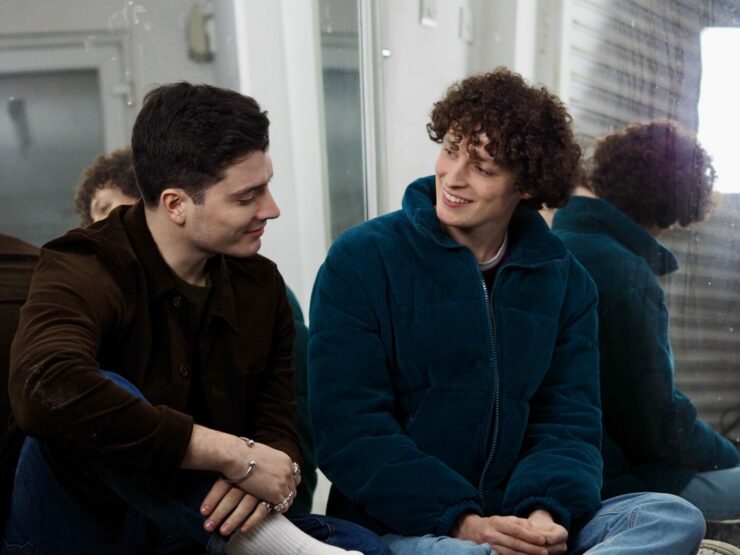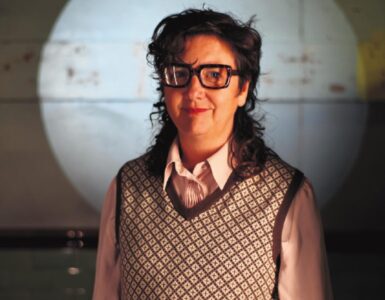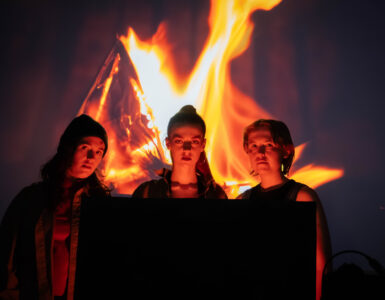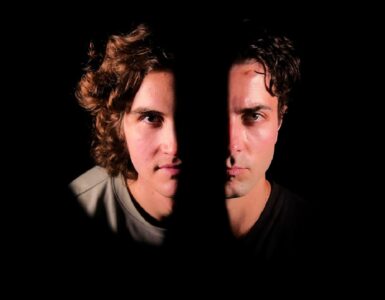Exploring and understanding the messy, difficult areas of queer relationships, Grey Area is an exciting new piece of theatre landing at VAULT Festival in two weeks time, put together by Homing Bird Theatre. We sat down with Jonny Peyton-Hill, performer and author of the piece, as well as the show’s Director Chiara Virgilio, to talk all things ableism, homobitransphobia, moral boundaries and nuances in relationships, oh, and Cherry Sourz. Take a read.
Catch Grey Area between February 14th and 19th at VAULT Festival. Tickets are available through the VAULT Festival Box Office.
Hey guys, so you’ve created a piece which exists in the messy, complex corners of queer relationships, asking us to consider the difference between self-love and egotism. What inspired you to create the piece?
Jonny: “Originally, if I’m being honest, Grey Area absolutely began as a piece of therapy. Some of the scenes are pretty much directly lifted from my life, some are totally made up and others are a mixture of fact and fiction. But the initial intention of writing the play was to understand this part of my life which I had not yet fully processed and turn what I would call the darkest time in my life into something I could see beauty in. It was so cathartic! It no longer seemed fair to paint myself in my mind as the hero, I had come to realise that parts of me were the villain too, and I wanted to make something that reflected that.”
“I wrote one scene back in 2020, and that’s all I thought it would ever be – a single standalone scene which would sit in my Documents folder forever. It almost was a writing challenge to myself, which created the foundation for the whole play: can I create something where both characters in a relationship have a moral high ground, while also transgressing other moral boundaries to equal the playing field? Can we love and hate them, agree and disagree all at the same time? I showed the scene to a close friend who was like “Jonny… write more!” and as I’m not one to back away from a challenge… I finished the first draft in three days. There was very little sleep involved but I’d say it was worth it.”
“At drama school, I was trained in devising from an autobiographical perspective and was always taught that you, as the creator, are the biggest well of creativity and inspiration you could ever need. No one understands your own life and has lived your exact experiences except… well, you. And using situations which I have been in was the perfect springboard to jump from scene to scene, weaving and forging this big old tapestry that I now call Grey Area.”
How has the process been of putting the piece together, especially as it explores difficult and personal areas such as homobitransphobia and ableism?
Jonny: “We’re trying to be extremely sensitive in our approach to how we portray mental health on stage. Showing very real human interactions and the struggles which surround them is how we hope to shed some light on the importance of talking and communication. When it comes to this topic we want to demonstrate how repressing our needs and emotions can affect those we love and the relationships we have with people around us. We want people to think twice about comments they make about those who are in an internal battle with themselves after having been privy to the intimate story we are trying to tell.”
“Our team is made up of exclusively LGBTQIA+ individuals who can all connect with the feelings of queer joy and also the negative experiences related to their identity. This collective understanding in the rehearsal room shapes Grey Area into something which stands outside the realm of oppression and is not intrinsically linked to the torture porn tropes of identity struggle and violence towards the community and is more focused on the way we love and live our lives. This is a story that portrays two openly queer individuals, which we believe has been treated with the same amount of care, respect and complexity we would expect of heteronormative narratives, which have populated our stages and screens for decades.”
“Visibility is so important, the chance to be able to show an authentic experience on stage and declare “we’re here, we exist” while also proving that a queer play does not have to be a play about being queer – it’s these bits of everyday representation which can really open up conversations, get people talking and let people see a side of life which may be different to their own. Giving a spotlight to queer voices, who speak openly and honestly on the urgency and importance to speak about mental health is our way of destigmatising these overarching societal issues.”
What are you hoping the audience takes away most from the piece and the themes that it explores?
Jonny: “We hope that an audience can see a bit of themselves in the play. There’s a bit of a Jackson and a bit of a Peter in everyone at some point and we want them to know that’s ok. We’re all allowed to be emotional, do things with the best intentions and fuck up every now and then – it’s all valid – as long as you take responsibility, step up and try to be better.”
“When people were reading the play in its early stages, they found things they could relate to in the characters and their situations that we were not expecting: some people read Grey Area as a play about growth, youth, and even about the arts industry. It opened the idea that Grey Area is not a singular experience, that it was shared in unique ways and allowed people to see in it what they wanted or needed to see. People said they felt acknowledged and less alone, that they could compare their own relationship history to it. We really hope that our wider pool of audiences at the VAULT Festival and King’s Head Theatre will feel a similar sense of comfort – this is the fuel which makes us want to share it far and wide.”
Tell us a little about your rehearsal process and give us a glimpse into how you’ve put the show together.
Chiara: “Since the show is non-chronological it was extremely important for us to lay everything out in order and understand Jackson and Peter’s story as it would traditionally pan out. We whacked everything on sticky notes, gave titles to the scenes and put it all on our master timeline. The play takes place over 7 years, creating an odyssey of sorts, so we have to figure out what changes from month-to-month and year-to-year, what stage the characters are at in their personal development and how the tension strains or relaxes the characters in every new scenario – with this groundwork informing us we can fragment it from there and can jump with ease, scene-to-scene and guide the audience in this journey. I as a director have a background in applied theatre and working with communities.”
“With the play containing some heavy scenes and subject matter, I believe it’s key to create a friendly, fun and open rehearsal room. My top priority is the well-being of the people involved – especially the actors’, considering the emotional rollercoaster the story takes them on in one hour! This means my approach is often more based on physical theatre practices (such as Lecoq’s) and giving directions regarding the actors’ movements, posture and tension, rather than on deep psychoanalysis of the characters and directions on the actors’ thoughts. It helps us ensure the process is sustainable for the actors while achieving naturalism on stage. For the same reason, we need to know how to “decompress” a room: we love to play stupid games, have a dance to pop songs in the morning and crack jokes, which can make all participants in the room feel more at ease and shake off whatever they don’t want to take home. As a company, we find merit in approaching the rehearsal process with an openness to devising – all ideas, opinions and thoughts are very much welcome and hierarchy is abolished, meaning everyone can have input.”
“There are a couple moments of intimacy within the text and in line with our very freeing rehearsal process, we want to guarantee everyone’s safety. During Jonny’s time at drama school, he was introduced to Ita O’Brien’s intimacy guidelines: a step-by-step formula for creating safe and realistic moments of intimacy, while Chiara developed her knowledge of intimacy direction with Yarit Dor, through Director’s Cut Theatre. We are also working with our wonderful movement director Kiren Virdee, who has been acting as our intimacy co-ordinator – an individual who enforces and facilitates moments of intimate contact which are within the actors’ personal boundaries. No one has to do anything they are uncomfortable with (there will always be an alternative way of doing something) and we run our choreography with specificity, as we would a fight sequence. Intimacy coordinators are becoming more and more common within rehearsal spaces and film/TV sets and we think it’s important to be among the wave of productions that are also employing these techniques.”
Now that we’re gearing up for VAULT Festival 2023, what are you most excited for?
Chiara: “We’ve been seeing so many exciting recommendations, Top Picks lists and artists promoting themselves all over social media, it’s hard not to get hyped about our peers and their incredible work. We really would like to show up and support as many of them as we can and have been putting together our own list of what we’d like to see!”
A” few of the ones we have our eye on include ‘Wasteman’, ‘Quench’, ‘For a Brief Moment and Never Again’, ‘Gush’, ‘How We Begin’, ‘It’s a Motherf**king Pleasure’, ‘Gun To Your Head’, our partners’ Paper Mug Theatre production “CON-VERSION” and our friends at Secreteriat with their show ‘Hexenhammer’.”
“It feels like a huge honour to share billing with such massive talent on a festival of this calibre and scale – we’re still pinching ourselves that it’s even happening, really. We’re so excited to be in these venues, soaking up the atmosphere and vibes. This is the first time VAULT has returned since the pandemic so we’re really happy to be amongst a community who have a passion for live performance and share our work with an audience who have been starved of the finest fringe work London has to offer for almost 3 years!”
Tell us all about the poster, which appears to be handcrafted!
Jonny: “We love our colourful poster! The two silhouettes on the bench have been hand-painted by Chiara, inspired by some shots we had taken in August for our R&D at the Pen Theatre. The idea was to portray the characters as we meet them in the first scene, and highlight what they have in common (represented by the colour yellow) while clearly showing their differences.”
Chiara: “While Peter presents himself as what feels like a deep blue – mysterious, laid back, pessimistic – Jackson enters boldly and bravely as red: enthusiastic, extroverted, dominant. The beauty about the way Jonny developed these characters, which I tried to bring into the poster, lies in the shades and nuances where these people meet, where they clash, and where they mix and influence each other. As a rom-com lover (although Grey Area definitely isn’t one) I like to believe that love and relationships can be one of our greatest tools for self-reflection and growth. Loving and being loved can make us face and help us heal parts of ourselves, even – or especially – when the process isn’t pretty. And if over time, we come to realise our colours don’t work well together, that’s okay. That’s what we hope the audience leaves with, and that’s the reason why the tool for the poster couldn’t have been anything other than watercolours.”
“Plus, we are self-funded and that’s what I had in my cupboard.”
Fitting with the themes of our magazine, if your show was an alcoholic or non-alcoholic beverage (think cocktails, mocktails, shots, beers, be creative!) what would it be?
Chiara: “I see Grey Area as a Sex On the Beach: sexy, sweet, but also sour, bold and strong. There is something in it for almost everyone, although different people will have a different favourite flavour.”
Jonny: “I think Grey Area is a shot of Cherry Sourz – immediately and strongly sour, but also thrilling alongside an edge of fun. Even though it’s something that can be difficult to swallow, you’ll definitely enjoy the experience and want another taste.”









